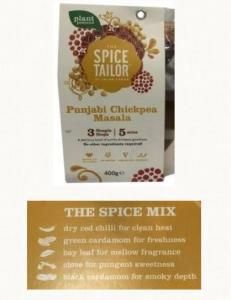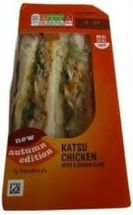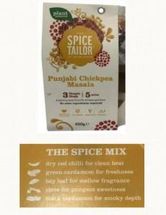3 ways for world cuisine food products to increase their appeal to consumers
Advertisement
More than six in ten world cuisine eaters consider themselves adventurous in trying new world cuisine foods, showing a great potential for home-focused world cuisine formats to thrive. Most say that world cuisine flavours – be they Indian, Chinese or Mexican – make an at-home lunch more exciting, this occasion having gained relevance thanks to the continuation of flexible working following COVID-19. As consumers look for ease and speed of preparation while trying to escape the boredom of traditional flavours, what more can world cuisine brands do to capture their appetite and increase potential usage occasions?

Sainsbury’s Autumn Edition Katsu Chicken Sandwich with a Ginger Slaw is a combination of a familiar format and less well-known flavours.
Mintel GNPD

Irie Eats Caribbean Curry Meal Kit informs consumers its suitability for both meat and meat-free dishes.
Mintel GNPD

The Spice Tailor by Anjum Anand Punjabi Chickpea Masala spells out flavour profiles using icons that consumers can easily understand.
Mintel GNPD



1. Drive exploration of world cuisines with “twists” in familiar dishes
While eating a familiar dish with a twist has encouraged nearly half of world cuisine eaters to further explore the cuisine from which the ‘twist’ originates, it is important to introduce emerging cuisine flavours first in more approachable categories, reframing them as ‘safe adventure’. For consumers, this can build familiarity and lower barriers to trial for when the dishes appear in their authentic forms in categories such as ready meals, seasonings and pastes. This echoes world cuisine flavours being a long-standing feature in categories such as sandwiches, savoury snacks and soup; the long tradition of international cuisines in the British diet underpinning this.
Even consumers who see themselves as adventurous use these familiar dishes as a stepping stone to further exploration. This reinforces how much authentic world cuisine products are reliant on their flavours being adopted by these more familiar hybrid products first, in order to drive interest and uptake. Foods such as savoury snacks and pizzas can benefit from jumping on emerging cuisine trends at the outset, rather than waiting for them to be established in their authentic form, given their popular use as a starting point to explore new cuisines.
2. Consider consumer interest in products that are suitable with both meat and meat-free dishes
Products which are suitable for use with both meat and meat-free dishes interest four in ten world cuisine eaters. This puts world cuisine foods in a strong position to benefit from the wider meat reduction trend, which has seen over a third of those who eat red meat/poultry say they are actively trying to reduce the amount they eat of them. With a greater focus on sustainability and meat reduction predicted to be long-term consequences of the pandemic, versatile products which offer consumers flexibility of choice will be increasingly relevant going forward.
Whilst many world cuisine products already detail how they are suitable to be used with both meat and vegetables, this information is often hard to find, featured in the back-of-pack recipe or in serving suggestions. Making such suitability more central to on-pack communication is clearly warranted in light of consumer interest, and also addresses sustainability concerns of consumers who wish to be eco-friendly in their food choices.
3. Spell out flavour profiles
Clear on-pack taste descriptions would prompt more than a quarter of those who have eaten world cuisines or are interested in trying them to try a new world cuisine dish. Spelling out the contribution of different herbs and spices to the overall flavour profile of a world cuisine product helps consumers to know what to expect from it, while also emphasising the complexity of the dish and the convenience offered by the shortcut product over scratch cooking. Additionally, it can also showcase a brand’s expertise in spices and in pairing flavours, further driving consumer interest and exploration in exotic ingredients, and potentially entice consumers to come back for more.
On-pack descriptions of spice level are already commonplace in this category, with many products pairing a ‘chilli rating’ with descriptions such as ‘medium’ and ‘hot’. Product descriptions also often detail the types of spices and herbs in them, however, more detailed information about what these bring to the dish in terms of flavour profiles is currently rare. Brands could look to alcoholic drinks brands for inspiration as to how taste descriptions can be communicated in a more visual way. For example, a spiderweb chart would lend itself to communicating the sweet, sour, salty, bitter and umami elements of a product’s flavour.
What we think
The world cuisine retail market will benefit from products that offer an affordable alternative to eating out, as household budgets are being squeezed by inflation. Brands can tap into consumer openness to world cuisine flavours by launching familiar dishes “with a twist” to lower the barriers to trial for less established cuisines. Versatile products suitable for meat-containing and meat-free meals can tap into the long-term flexitarian trend, whilst spelling out flavour profiles will help consumers know what to expect and boost the convenience proposition of these products. The predicted long-term increase in flexible working brought about by COVID-19 points to potential for home-focused formats and brands to increase their potential usage occasions.































































